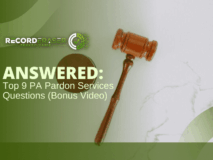
People often wonder which part of the pardon and expungement process in Pennsylvania they would get stuck on. Truthfully, anyone can get stuck at any point in the PA pardon process. That can be a problem when you have a criminal conviction that’s affecting the quality of your life.
Going through this process can help you move on from your criminal charges. You can receive a copy of your criminal history and know your options for clearing your record. However, proceeding with your application for expungement or pardon can be daunting. Whether you face money, time, or confusion issues, it’s important to have answers to your questions so you have the confidence to proceed with the application process.
Our experienced Pennsylvania pardon and expungement attorney answers some of the most common questions about the process and offers solutions.
Why Even Go Through the PA Pardon Process?
Employment is the main problem people face, making them go through the PA pardon process. Even low-level offenses can block a person’s job prospects, preventing them from getting back on track with their life.
Time is another one because there is no way to speed it up. Whether you go through the PA expungement or pardon process for your offenses, you would need to commit to it and expect you might get stuck along the way.
Hundreds of thousands of people struggle with criminal convictions. When you do get stuck, understanding where the problem is may present an opportunity so you can overcome your obstacles in the system.
9 Common Questions About the PA Pardon and Expungement Process
Here are the answers to Record Eraser’s most common questions concerning the pardon and expungement process in PA:
1. How are marijuana convictions different from any other kind of convictions?
The only difference between felony offenses or misdemeanor convictions related to marijuana and other convictions is the time it takes to process. The Board of Pardons has been expediting the review of marijuana-related cases to the point that they go through them in just a year instead of the regular two years.
You would still go through the same process. You would still explain how the crime occurred and what you’ve done with your life since then. There may be fewer investigations involved in your review, although your entire record will remain up for consideration. In addition, you still need to get in line, even if it might be quicker than normal.
Notably, the expedited cases include marijuana-only cases. So, if your felony conviction involved other substances like pills or opiates, you will no longer be on the expedited track. Thus, you will go through the regular two-year review process.
Read More About PA Marijuana Conviction Pardons and Expungements >

2. What felonies cannot be expunged?
You cannot expunge a felony until the governor pardons it. Moreover, there is no limit to the kind of felony or the kind of charge that you can petition the governor and the Board of Pardons for review.
However, it’s more of a question of how you should explain the crime that occurred, what you’ve done with your life since then, and why you are a good candidate to convince the Board that you should have your record recommended to the governor for a pardon.
3. How many felonies can be pardoned?
There is no limit to the number of felonies you can request an application form to pardon. You can expunge something if it is a conviction that has been pardoned. All pardons give you official permission to expunge the record that is required for every felony and misdemeanor conviction. The expungement process is the last process that you file in the county of conviction to get a court order to clear your criminal record. However, the time when the crimes occurred, what was involved at the time of the crime, and what you’ve done with your life since then will all come into play.
The number of felonies and misdemeanor convictions is not as significant as what you’ve done with your life since they occurred and how you explain why they happened in the first place. Usually, the Board and everyone involved are accepting of typical explanations, like that you were young and have since had time to clean up your act.

4. How do I know if my record has been expunged in Pennsylvania?
You can go to Pennsylvania’s Unified Judicial System (UJS) portal to search for a public record. Type in your name and date of birth to see what pops up. If your record comes up, then it has yet to be expunged. Whatever pops up is what you’re trying to clear. However, records that don’t show up do not automatically mean that they are expunged.
Perhaps the clean slate algorithm sealed or hid them, meaning there’s a chance that someone can use them against you. Another reason it might not show up is because of typos with your name or date of birth. With Record Eraser, you can use a service that writes off to the Pennsylvania State Police to request a full-access review
5. If my record has been sealed, does that mean it’s expunged, and I don’t need to disclose it anymore?
The record-sealing algorithm hides very small misdemeanors and summary offenses over five years old in certain situations. Those records are still available. Whether they’re a misdemeanor or summary conviction, they could still show up on an employer’s request for a background.
They can also show up on FBI records and the Pennsylvania State Police. As such, sealed and hidden records don’t mean expungement. You need to scrape them out and disclose them so we will know how to get rid of them by filing an application form for pardon or expungement.
6. Will a juvenile record show up on my background check?
Yes, and it depends. Juvenile adjudications may not show up if they’re misdemeanor adjudications. What comes into play includes who is asking for your record, the tools they use to check your background, and the severity of your juvenile offenses. Juvenile felonies can still show up on background checks.
7. How are they cleared?
You can petition juvenile adjudications in the county of conviction for removal after you turn 18 and you’ve been out of trouble for over five years if the District Attorney consents. Otherwise, you may need to have a hearing.
8. Do I have to disclose a misdemeanor after seven years?
You must disclose your misdemeanors regardless of how much time has passed. Even if the clean slate algorithm hides certain things after 10 years or summary offenses after five years, they are not expunged and are still there.
9. What is a commutation?
Commutation is part of the pardon and clemency process. You would file a clemency application the same way as a pardon application with the Pennsylvania Board of Pardons. Commutation is a special kind of pardon application filed for incarcerated people serving lengthy prison sentences.
The Solution
You might benefit from experience in the PA pardon process to navigate it correctly. Although you can go to the appropriate public office to apply for expungement or pardon, you might get stuck along the way. You may already be stuck and want to proceed with the process.
Record Eraser is here to handle your application on your behalf. We have the resources to assess your circumstances and determine the best ways forward.
Read More About Getting a Pardon in PA >
Final Thoughts
The PA pardon process can be convoluted and daunting for anyone who wants to move on from the past. It may be best to have a legal expert navigate the system on your behalf. Let our experts research your record today.




